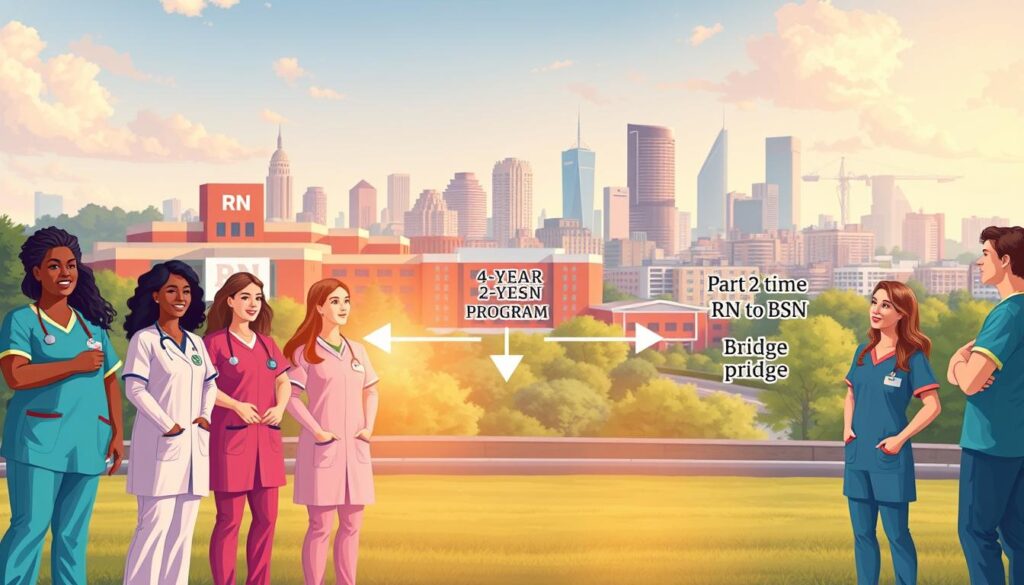If you’re considering a career in healthcare, you’ve likely noticed that Registered Nurse (RN) positions are consistently in high demand. The healthcare industry relies heavily on skilled RNs to provide quality patient care.
The demand for RNs is not just a current trend; it’s a growing need. According to the Bureau of Labor Statistics, the employment of RNs is projected to grow 6% over the next several years, faster than the average for all occupations. This growth is driven by an aging population and an increased focus on healthcare.
Key Takeaways
- The demand for RNs is expected to grow 6% in the coming years.
- RNs play a crucial role in the healthcare system, providing essential patient care.
- A career as an RN offers stability and opportunities for advancement.
- The healthcare industry’s reliance on RNs is driven by demographic changes.
- RN positions are available in various healthcare settings.
The Current Landscape of Healthcare Staffing in 2023
As we navigate the complexities of the healthcare industry in 2023, it’s clear that registered nurse jobs are at the forefront of in-demand healthcare careers. The demand for healthcare services continues to grow, driven by various factors including an aging population and an increased focus on healthcare.
Key Statistics on Nursing Demand Nationwide
The U.S. Bureau of Labor Statistics (BLS) projects over 219,000 registered nurse job openings annually through 2031. This statistic underscores the significant demand for nursing professionals across the country. You can explore more about the nursing shortage on the American Association of Colleges of Nursing website.
| Year | Projected RN Job Openings |
|---|---|
| 2023 | 219,000+ |
| 2031 | 219,000+ |
Regional Variations in RN Job Availability
While the demand for RNs is a nationwide phenomenon, there are regional variations in job availability. Rural areas, in particular, face challenges in filling specialized medical positions, as highlighted by a report on rural healthcare hiring trends. You should consider these regional differences when exploring RN career opportunities.

Why Registered Nurse Jobs Remain the Most In-Demand Healthcare Careers
Registered nurse positions are consistently among the most sought-after careers in healthcare, and this trend shows no signs of abating. You are about to explore the key factors driving this demand.
Aging Population and Increased Healthcare Needs
The U.S. population is aging rapidly, with significant implications for healthcare demand. The U.S. population aged 65 and older is projected to surpass 95 million by 2060, more than doubling its size from 2020. This demographic shift results in increased healthcare needs, as older adults often require more medical care due to chronic conditions and age-related health issues. Consequently, the demand for skilled registered nurses who can provide quality care to this growing population is on the rise.

Nursing Shortage and Retirement Wave
The healthcare industry is facing a significant nursing shortage, exacerbated by a wave of retirements among experienced RNs. As many nurses from the baby boomer generation reach retirement age, the need for new talent to replace them becomes increasingly pressing. This shortage is particularly concerning in certain regions where the existing workforce is already stretched thin, making it challenging to provide adequate care to patients. You can expect the demand for newly graduated RNs to continue growing as the industry seeks to fill these gaps.
Expansion of Healthcare Services and Settings
The expansion of healthcare services and settings is another factor driving the demand for RNs. As healthcare delivery models evolve, services are being provided in a wider range of settings, from traditional hospitals to outpatient clinics, home healthcare, and community health organizations. This diversification creates new opportunities for RNs to work in various roles, from direct patient care to case management and health education. The growth in these areas requires a robust workforce of skilled nurses who can adapt to different care environments.
In conclusion, the combination of an aging population, nursing shortage, and expansion of healthcare services ensures that registered nurse jobs will remain among the most in-demand healthcare careers. As you consider a career in healthcare, understanding these factors can help you make informed decisions about your professional path.
Educational Pathways to Becoming a Registered Nurse
If you’re interested in becoming a registered nurse, understanding the various educational routes is crucial. The path you choose can significantly impact your career trajectory and opportunities in the healthcare sector.
Associate Degree in Nursing (ADN) Route
The Associate Degree in Nursing (ADN) is a popular pathway, typically taking two years to complete. ADN programs are offered at community colleges and some universities, providing a foundational education in nursing principles, practices, and clinical skills. Graduates are eligible to take the NCLEX-RN exam to become licensed RNs.
Bachelor of Science in Nursing (BSN) Programs
Bachelor of Science in Nursing (BSN) programs are four-year degrees that offer a more comprehensive education, including nursing theory, research, and leadership. BSN graduates are also eligible for the NCLEX-RN exam and often have broader career opportunities and higher salary potential compared to ADN holders.
Accelerated Programs for Career Changers
For individuals looking to transition into nursing from another career, accelerated BSN or ADN programs are available. These intensive programs can be completed in as little as 12-18 months and are designed for those who already hold a bachelor’s degree in another field.
Online and Hybrid Learning Options
With the advancement in educational technology, online and hybrid nursing programs have become increasingly popular. These programs offer flexibility for students who need to balance their studies with other responsibilities, though clinical components typically require in-person attendance.
Nursing programs are structured in various ways, including full-time, part-time, online, in-person, and hybrid models, as well as accelerated and direct-entry programs. This diversity allows prospective students to choose a pathway that best fits their lifestyle, career goals, and learning preferences.
| Program Type | Duration | Key Features |
|---|---|---|
| ADN | 2 years | Foundational nursing education, clinical skills |
| BSN | 4 years | Comprehensive education, nursing theory, research, leadership |
| Accelerated | 12-18 months | Intensive, for career changers with a prior degree |
| Online/Hybrid | Varies | Flexible scheduling, with some in-person clinical requirements |

Essential Qualifications and Skills for Today’s RN Positions
To succeed in today’s healthcare environment, you need a unique blend of clinical skills, communication skills, and adaptability. As a registered nurse, you will be expected to provide high-quality patient care, work effectively with healthcare teams, and navigate complex medical situations.
Clinical skills are fundamental to RN positions, enabling you to assess patients, administer medications, and perform various medical procedures. Strong communication skills are also crucial, allowing you to convey patient information, educate families, and collaborate with other healthcare professionals.
Adaptability is another key skill, as you will need to adjust to changing patient needs, new medical technologies, and evolving healthcare policies. The flexibility of RN careers is a significant advantage, as you can work in various specialties and settings without requiring additional education or training. This versatility is a key reason why RN positions remain among the most in-demand healthcare careers.
By combining these essential qualifications and skills, you can thrive in a rewarding RN career and contribute to the ever-changing healthcare landscape.